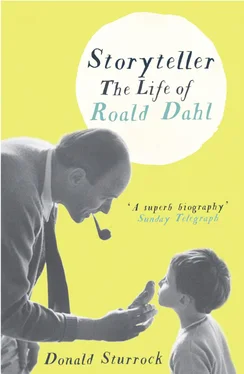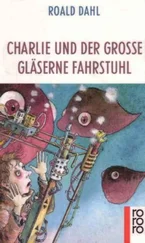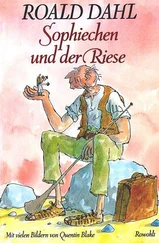Her son’s tastes were catholic, but his preference was generally for exotic tales of action, adventure and the imagination: the adventure stories of G. A. Henty, C. S. Forester, and Henry Rider Haggard, for example, as well as espionage thrillers such as Secret of the Baltic by T. C. Bridges and J. Storer Clouston’s The Spy in Black, a First World War adventure set in the Orkneys that would later become Michael Powell and Emeric Press-burger’s first film. Together with Douglas Highton, Roald also developed a fascination with Victorian ghost stories and Gothic fantasy, which he was to maintain for the rest of his life. The two boys read M. R. James and Edgar Allan Poe together, and Roald gave his friend a copy of Ambrose Bierce’s 1893 collection of grand guignol short stories Can Such Things Be? as a birthday present. Dahl later admitted that Bierce’s tales of ghosts, ghouls, psychics, robots and werewolves “scared me a lot”, 58adding elsewhere that the book was so frightening he “couldn’t turn the light off at night”. 59He believed it “profoundly fascinated and probably influenced” him. 60The book was so important to him that, almost sixty years later, Roald asked his friend whether he could have it back. Highton obliged and, in return, Roald sent him a signed copy of Boy with a warm dedication apologizing for a few of his more lurid descriptions of St Peter’s. These were, he confessed, “coloured by my natural sense of fantasy”. 61
This love of fantasy did not transfer itself to things medical, for which Dahl was already developing a sharply observant eye. Accident and disease-prone throughout his life, Dahl’s childhood was packed with grisly medical encounters and Boy is full of hair-raising (and mostly true) accounts of these. His nose is “cut clean off” in a car crash and stitched back on by a doctor at home on the kitchen table. Then, on holiday in Norway, a doctor with a “round mirror strapped to his forehead” and a nurse “carrying a red rubber apron and a curved enamel bowl” remove his adenoids without using anaesthetic. Dahl often uses the adjective “curved” when he wants to describe something sinister, while gleaming metal also usually presages pain. Here a “long shiny steel instrument”, with a blade that is “very small, very sharp and very shiny”, disappears high up into the roof of his mouth. The doctor’s hand gives “four or five very quick little twists” and the next moment, “out of my mouth into the basin came tumbling a whole mass of flesh and blood”. 62Looking at the “huge red lumps” that had fallen out of his mouth, Dahl’s first thought was that the doctor had cut out the middle of his head.
Back at school it is not long before he has another encounter with doctor and scalpel. This one has another “long steel handle” and a “small pointed blade”. The young victim in this instance was not Dahl himself, but a fellow patient in the sickroom, Ellis, who has “an immense and angry-looking boil on the inside of his thigh. I saw it,” Roald boasts enthusiastically. “It was as big as a plum and about the same colour.” Ellis’s outraged screams of pain and his floods of tears, as the doctor throws a towel over his patient’s face and lances the purple swelling, driving the knife deep into the boil, provoke no sympathy from either doctor or the “mountainous-bosomed” Matron. “Don’t make such a fuss about nothing,” is all she says. Dahl himself is only marginally more sympathetic, admitting that he thinks the doctor “handled things rather cleverly”. “Pain,” he concludes, “was something we were expected to endure.” 63
Some things, however, were too much for his young readers. In the first draft of Boy, for example, Ellis was referred to by his real name, Ford, and Dahl added a coda to the story of the boil-lancing, which he removed before the book was published, almost certainly because he felt it was too sombre and gloomy. Ford survived the boil, he wrote, adding that “tragically it was all for nothing”, 64and explaining that, two years later, during an outbreak of measles at the school, the boy died. In this omission also Dahl may well have been being true to his unsentimental child’s eye, for in his letters home from school the death is barely mentioned. His own exploits on horseback and a description of a toy motor canoe, with an automated rower, “whose joints move like real”, 65get far more attention.
It is possible too that, in this regard, Roald was looking after his mother by protecting her from bad news. Perhaps he was keeping his word to the doctor in Llandaff, and taking trouble not to worry her. Certainly, his own accidents and ailments are only reported when the patient is on the mend. And there are never any complaints. Instead, he learns early how to use misfortune as entertainment. “On Bristol station,” he tells her, “Hoggart was sick, and when I looked at it, I was sick, but now I am quite all right.” 66Moreover, behind the desire to entertain and shock, there are traces of great sensitivity. Writing to comfort his mother on the seventh anniversary of his sister Astri’s death, he comments: “I don’t suppose the grave has ever looked nicer than it does now, with all the heather on it.” 67But drama is what excites him most. A trip into Weston to see the Duke and Duchess of York (the future King George VI and Queen Elizabeth), who were in town to open a new hospital, is memorable because their train ran someone over and because a local ironmonger got so excited that he fired six blank shots into the air and terrified the nervous duke. 68By his final year at St Peter’s in 1929, a thuggish quality was starting to reveal itself. After playing rugby against a local team, Roald writes boastfully of his own school’s “rough plays”, which were strongly censured by the match referee. “We got four of their chaps crying,” he brags to his mother, as if pleased that he can now inflict injury as well as receive it. 69
By the age of twelve he has also started to notice class and accents, remarking to his mother that the man who cleans his boots calls High-ton “Oiton” and himself “Dorl”, 70and that while playing football, he has overheard some navvies arguing with the referee on a neighbouring pitch. Their language fascinates him. “Garn, stop yer gob, ref, or I’ll come along and clump you over the ear!” 71he records with evident delight. With Highton, he starts doing the Daily Telegraph crossword puzzle, and experimenting with his own clumsy but original word games. A competitor in the school boxing finals is described as “a lump of very conceited mass”, 72while a singer practising in the music room below him is evoked in terms that prefigure some of the language of The BFG. “The noise,” he writes, “closely resembles that of a fly’s kneecap, rattled about in a bilious buttercup, both having kidney trouble and lumbago!” 73His eye for the quirky and absurd is also developing fast. He is intrigued by a letter from his sister Ellen, who had reported seeing “electrified frogs”, 74while, in a film about a silver mine, he laughs out loud when he sees “a lot of fat old women” mashing up the slurry “in order to get the silver out”. 75Obesity is always a source of comment, usually of amusement and sometimes of condemnation. A passenger at Yatton Station is “at least nine feet around the tummy in circumference”, 76and when “two elderly females” come to the school to act out Shakespeare’s Twelfth Night, Roald observes critically that “the fattest, in a purple dress, didn’t know it well, so had to hold a book all the time”. 77Even Sofie Magdalene is not exempt from his fat-detecting eye. In the summer of 1929, while on holiday in Cornwall, he writes to his mother warning her that although they are saving her a large room with a double bed, “I am sure your hips will protrude from each side.” 78
Читать дальше








